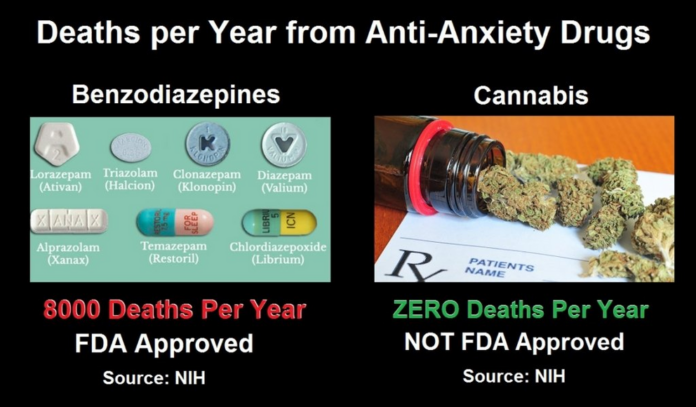Cannabis: the ‘gateway drug’ leading AWAY from prescription drug addiction
There are currently over 32 million Americans using FDA-approved anti-anxiety prescription drugs (benzodiazepines), based on 2018 data. That includes almost 400,000 children under the age of 5 years old, and over 100,000 infants under the age of 1. (Source.)
According to a study published on the National Institute of Health (NIH) website in 2016, benzodiazepine prescriptions increased 4.1 percent in 1996 to 5.6 percent in 2013, a 37 percent increase, while deaths from benzodiazepine prescriptions increased from 0.58 per 100,000 adults to about 3 per 100,000 adults, or about 8,000 deaths per year, an increase of more than 500 percent. (Source.)
And these statistics are for just one class of anti-psychotic drugs, anti-anxiety (benzodiazepine) drugs. According to data from 2020, about 77 million Americans are taking some form of an anti-psychotic drug. (Source).
Over 100 people die every day in the U.S. from prescription drugs (pre-COVID, that number would be much higher today), and over 50% of all drug deaths in the U.S. are from prescription drugs. (Source.)
By way of contrast, about 52 million Americans use cannabis (marijuana), which is still illegal at the federal level and not FDA-approved, and to date there has not been a single death attributed to cannabis use, according to the NIH.
There are no reports of teens or adults dying from marijuana alone.
But the pharmaceutical companies are desperately trying to develop a drug to help people stop using cannabis, or what is referred to as “marijuana use disorder.”
That’s because the withdrawal side effects from trying to stop using cannabis are so horrible (sarcasm):
No medications are currently available to treat marijuana use disorder.
Many people who use marijuana long term and are trying to quit report mild withdrawal symptoms that make quitting difficult. These include:
- grouchiness
- sleeplessness
- decreased appetite
- anxiety
- cravings
(Source.)
Compare those cannabis withdrawal symptoms to the withdrawal symptoms of FDA-approved benzodiazepine prescription drugs:
Benzodiazepine withdrawal can bring about a wide range of symptoms such as:
- Sweating.
- Increased heartrate (greater than 100 beats per minute).
- Anxiety.
- Agitation.
- Insomnia.
- Hand tremor.
- Perceptual disturbances (i.e., hallucinations).
- Seizures.
- Delirium characterized by disturbances in consciousness and cognition, with visual, auditory, or tactile hallucinations.
Some people also experience anxiety and depression for several weeks or months following acute withdrawal. In severe cases, especially when untreated, benzodiazepine withdrawal may be fatal. (Source.)
Gateway Drug?
The corporate media and Big Pharma have been saying for decades now that cannabis use is a “gateway drug” leading people to become addicted to more dangerous drugs.
Well, I think everyone agrees that marijuana is a “gateway drug”, but a “gateway” leading in which direction?
The evidence points to cannabis use as a “gateway” AWAY from deadly prescription drugs, such as opioids and anti-psychotics.
An article published in Boston Magazine last week interviewed educated, suburban mothers who were turning away from alcohol in favor of cannabis, referred to as “cannamoms”.
The Really High Housewives of MetroWest
Out with the chardonnay, in with the gummies—why a new generation of Greater Boston parents are choosing cannabis to cope.
How did we get from “wine moms” to “weed moms”? Obviously, the legalization of cannabis has been a key factor, leading to increased accessibility and acceptability.
We spend way more time actually caring for our children than our own parents ever did—in hopes that this highly involved approach will maximize our child’s chances of future success. But at what cost? Parents are exhausted and stressed out. Is it any wonder mothers—who still take on the majority of childcare responsibilities—need something to take the edge off at the end of a long day?
That “something” used to be alcohol. Once upon a time, my friends and I enthusiastically embraced wine-mom culture, hosting happy-hour playdates with juice boxes, Goldfish, and chardonnay. We’d giggle knowingly at memes like “Oops, did I buy wine instead of milk again?” and dab at our faces with cocktail napkins inscribed with, “Shh, it’s my turn to wine.” Mommy juice helped us cope with the stresses of parenting—but only just.
Then the pandemic hit, and our carefully crafted façades crumbled. Suddenly, our children and spouses were home with us 24/7, and our worlds were turned upside down. We were homeschooling, working, and trying to hold it all together. It wasn’t long before Wine Wednesdays were preceded by Margarita Mondays and Boozeday Tuesdays—followed by Thirsty Thursdays. Gathering for drinks around a fire pit, bundled up in winter parkas and boots, gave us something to look forward to during that particularly bleak period.
About two years in, though, we began to feel pickled. Even one glass of wine gave me a headache or interrupted my sleep—and I wasn’t alone. Some of my friends were also begging off a second pour—it just wasn’t worth feeling like crap the next day. That’s when I first heard of cannabis gummies making the rounds in my cloistered suburban enclave. Word on the oak-lined street was that it gave you a nice buzz without the unpleasant side effects. Better yet, you could still carry out your duties as a parent—say, watching your daughter’s strings concert—and enjoy it a hell of a lot more than you would have otherwise.
That sounded enticing, but as someone who grew up in the 1980s with Nancy Reagan telling me to “Just say no” to drugs, I’d need a little extra push to convince me to give cannabis a go. (Full article.)
While I am not endorsing recreational use for drugs, or taking drugs at all to cope with “anxiety” in life, it sure looks to me that cannabis is being used as the new “gateway” drug OUT of dependence upon deadly prescription drugs, and also alcohol abuse.
Of course that means decreased revenues for Big Pharma, and not just for anti-anxiety drugs.

